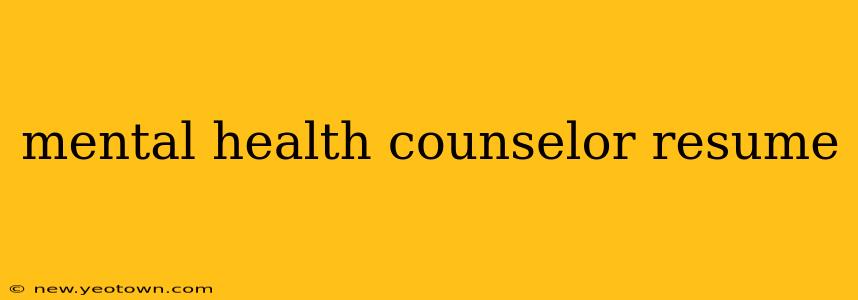Crafting a Compelling Mental Health Counselor Resume: A Story of Impact
Finding the perfect job as a mental health counselor requires more than just listing your skills and experience. It's about telling a compelling story – a story of your dedication, expertise, and the positive impact you've made on the lives of others. Your resume is the first chapter of that story, and it needs to be captivating. Let's explore how to craft a resume that not only showcases your qualifications but also resonates with potential employers.
Headline: More Than Just a Title
Instead of a simple "Mental Health Counselor," consider a headline that highlights your specialization and key strengths. For example:
- Licensed Clinical Social Worker (LCSW) specializing in Trauma-Informed Therapy for Adolescents
- Experienced Mental Health Counselor providing CBT and DBT to Adults struggling with Anxiety and Depression
- Board-Certified Psychiatric Nurse Practitioner (PMHNP) with a passion for integrated care
This immediately grabs the reader's attention and positions you as a specialist within the field.
Summary/Objective: Setting the Stage
A concise and compelling summary or objective statement sets the tone for the rest of your resume. Focus on your key accomplishments and career goals, tailoring it to each specific job application.
-
Example (Summary): Highly motivated and compassionate LCSW with 5+ years of experience providing effective therapy to adolescents experiencing trauma. Proven ability to build rapport, develop individualized treatment plans, and achieve positive client outcomes. Seeking a challenging role in a supportive environment where I can leverage my skills to make a significant difference.
-
Example (Objective): To obtain a position as a Mental Health Counselor at [Organization Name], utilizing my expertise in CBT and DBT to contribute to a collaborative and patient-centered team dedicated to providing high-quality mental health services.
Experience: Showcasing Your Impact
This section is crucial. Don't just list your duties; quantify your accomplishments using the STAR method (Situation, Task, Action, Result).
- Instead of: Provided individual therapy sessions.
- Try: Developed and implemented individualized trauma-informed therapy plans for 15 adolescents, resulting in a 70% reduction in reported anxiety symptoms within 3 months of treatment (as measured by the GAD-7 scale).
Skills: Demonstrating Your Expertise
List both hard and soft skills relevant to mental health counseling. This includes:
- Therapeutic Modalities: CBT, DBT, EMDR, Trauma-Focused Therapy, etc.
- Assessment Tools: Beck Depression Inventory (BDI), Minnesota Multiphasic Personality Inventory (MMPI), etc.
- Software Proficiency: Electronic Health Records (EHR) systems, telehealth platforms.
- Soft Skills: Active listening, empathy, communication, crisis intervention, cultural competency, collaboration.
Education & Certifications: Establishing Credibility
Clearly outline your education, licenses, and certifications. Include:
- Degree: Master's in Social Work (MSW), Master's in Counseling (MA), etc.
- Licenses & Certifications: Licensed Professional Counselor (LPC), Licensed Marriage and Family Therapist (LMFT), etc.
- Continuing Education: Highlight relevant training and workshops to showcase your commitment to professional development.
Additional Sections (Optional):
- Publications: If applicable, list any publications or presentations.
- Volunteer Experience: Showcases your commitment to the field.
- Awards & Recognition: Highlights your achievements.
Frequently Asked Questions (PAAs) Addressed in Resume Context:
While a resume doesn't directly answer questions, structuring it effectively implicitly addresses many concerns potential employers might have. For example:
How do I highlight my experience with diverse populations? Integrate this into your experience section. For instance, mention specific cultural considerations you've addressed or your success in working with clients from various backgrounds.
What certifications or specializations should I emphasize? Highlight certifications relevant to the specific job description. If the job posting emphasizes CBT, make sure that’s prominently featured in your skills section.
How can I showcase my skills in crisis intervention? Use the STAR method in your experience section to describe specific situations where you successfully intervened in a crisis.
How do I demonstrate my commitment to ethical practice? This is implicit in your credentials and licensure. You can also briefly mention adhering to professional codes of conduct in your summary statement.
By carefully crafting each section and incorporating a compelling narrative, your mental health counselor resume will stand out from the competition and effectively convey your value to potential employers. Remember, it's not just about what you did, but the impact you made.

